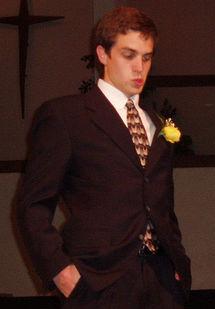Young man, recently kicked out of a Buddhist convent, is looking for a family to love him.
Young man, recently kicked out of a Buddhist convent, is looking for a family to love him.
Many of you know the Estradas, and know that they're a great family. Will and Jordan are well-known at PHC as great guys, good-natured and friendly and welcoming. I'm hoping their reputation is true, because my currently-fragile emotional state depends on them right now.
I recently joined a Buddhist convent because I liked the people there. Bad idea. I was ignored for a few weeks, and then they found out I was there and kicked me out on my ear - while Lauren laughed at me. ouch.
here's a copy of my application to join the (crucial edit: the -Estradas Only!-) blogring:
About You
it's Derby, you know me (will and jordan do, anyway)
Why You'd Like to Join
I was recently kicked out of the Buddhist Convent by Lauren, (I think at the behest of Naomi, because Lauren isn't mean like she is , even though I love her in the fashion of a Christian brother) because I was not a girl. The blogring specifically said that the Buddhist Convent was "for girls", and I am definitely for girls, but they made it clear that they are not for me. So now I am feeling very left out, and just need a family to welcome me again. All you have to do is let me into this blogring. I'm not asking you, I'm begging that you let me feel loved again. *tears*
, even though I love her in the fashion of a Christian brother) because I was not a girl. The blogring specifically said that the Buddhist Convent was "for girls", and I am definitely for girls, but they made it clear that they are not for me. So now I am feeling very left out, and just need a family to welcome me again. All you have to do is let me into this blogring. I'm not asking you, I'm begging that you let me feel loved again. *tears*

If they reject this, I am holding Jordan and Will personally responsible for gleefully confirming my status as an outcast from society. I know my brother already "hates me," and I "haven't seen my parents" in a few months. It's getting pretty bad.
In other news, I plan on visiting my second home, NoVA, Wed. evening through Monday. I hope that you, my reader, will be there too.
pic credits to zoneonepress, used under their Creative Commons license
I'm taking comments on xanga for once.
Many of you know the Estradas, and know that they're a great family. Will and Jordan are well-known at PHC as great guys, good-natured and friendly and welcoming. I'm hoping their reputation is true, because my currently-fragile emotional state depends on them right now.
I recently joined a Buddhist convent because I liked the people there. Bad idea. I was ignored for a few weeks, and then they found out I was there and kicked me out on my ear - while Lauren laughed at me. ouch.
here's a copy of my application to join the (crucial edit: the -Estradas Only!-) blogring:
About You
it's Derby, you know me (will and jordan do, anyway)
Why You'd Like to Join
I was recently kicked out of the Buddhist Convent by Lauren, (I think at the behest of Naomi, because Lauren isn't mean like she is

If they reject this, I am holding Jordan and Will personally responsible for gleefully confirming my status as an outcast from society. I know my brother already "hates me," and I "haven't seen my parents" in a few months. It's getting pretty bad.
In other news, I plan on visiting my second home, NoVA, Wed. evening through Monday. I hope that you, my reader, will be there too.
pic credits to zoneonepress, used under their Creative Commons license
I'm taking comments on xanga for once.




